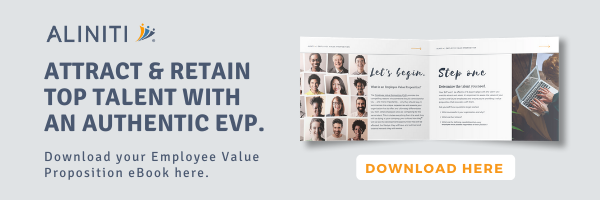“I can’t hire and keep people. That’s my challenge. Can you help me?” the CEO asked.
“Maybe,” we replied. “But first, help us understand something. Why should someone come work for you in the first place? And more importantly, why should they stay?”
She thought about her answer and told us her company has steady work, decent pay and good benefits. Overtime is available for someone who wants it.
“We’re curious, why do your customers buy from you?”
She answered this question without hesitating. “We have the capability to provide our customers turnkey solutions. We take the time to get to know them and their business. They think of us as a partner “
“So, they don’t buy from you because of your quality? Or, your ability to ship on time or your price?”
“Those things are obviously important,” she said matter-of-factly. “But they are expected -- they’re just table stakes. Almost all of our competitors can deliver those things. Our customers buy from us and keep using us because we are a reliable business partner that helps them create value for their customers. That’s our value proposition and what sets us apart – meeting quality and delivery expectations just earns you the right to be in the game.”
It occurred to us that there was a parallel between her company’s value proposition and a person’s expectations about their job.
“Doesn’t everyone want their employer to offer steady work, competitive pay and benefits? Aren’t those things just fundamental expectations, like quality, on-time delivery and competitive prices? I mean, no one takes a job hoping the work isn’t reliable and they will be underpaid, do they?”
“Of course not,” she replied.
“Well, if that’s true, and if the only value a person can expect to receive from working for your organization is a steady paycheck, are you not the equivalent of the competitor who is competing on price to win over customers? And are your employees not more likely to leave for an organization for someone who offers them something more?”
“Yes” she said. “I see your point. So, what’s the answer?”
We’ve had various versions of this conversation with several CEOs in recent months. In our experience, the best strategy for combating employee churn is not handcuffing people to your organization by offering them more money.
It’s developing an employee value proposition (EVP) that changes the meaning of the person’s relationship with your organization.
An EVP summarizes the things that a person experiences which differentiate you from other employers who are competing for the same talent. An effective employee value proposition is authentic. EVPs lacking in authenticity, leave people feeling mislead or baited and switched.

How do you develop your EVP? You can start by asking what a person will find interesting or valuable about:
- the work they will be doing at your company;
- your culture;
- how they will be led;
- the development opportunities they will be afforded;
- the lifestyle they will have; or
- the extrinsic and external rewards they will receive.
Not all of these things will influence your company’s employee value proposition, and that’s okay.
Next, filter your answers until you find the critical few things that a person will experience and miss the most about your company if they left for another employer. Then – and here’s the big lift – ensure your organization’s behaviors and practices fully support your EVP just as they fully support the promises you make to your customers.
A compelling employee value proposition is not a panacea for stopping all regrettable employee turnover. But it will change how your employees value your organization. It is also the foundation of your employer brand.
And, as it turns out, most people value meaningful work, control over their lives, and positive relationships more than money.
%20Full%20Color.png?width=250&name=Aliniti%20plus%20Tagline%20(Registered)%20Full%20Color.png)


